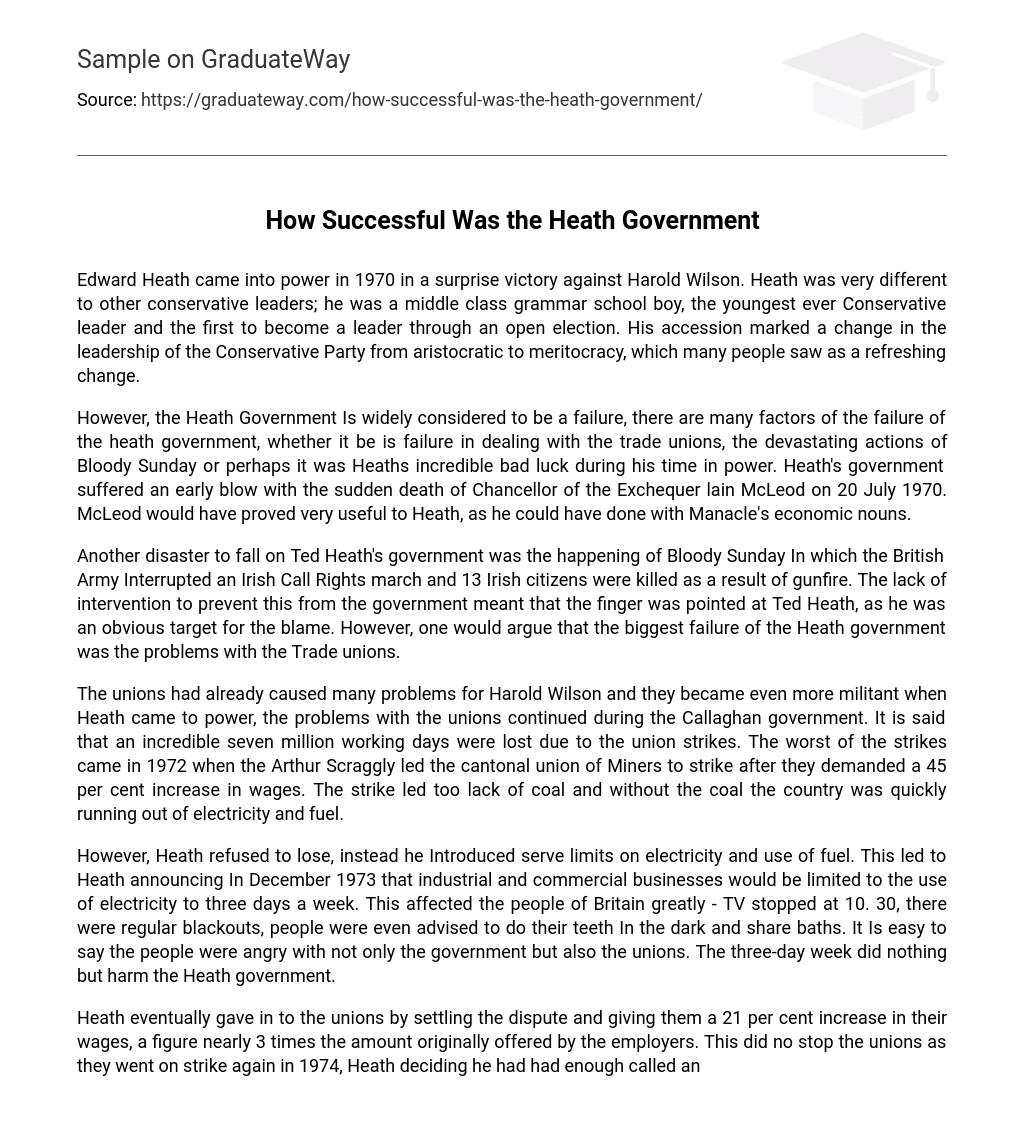Edward Heath, who became Prime Minister in 1970 by defeating Harold Wilson in a surprising election result, stood out from other conservative leaders due to his background as a middle-class grammar school student. Being the youngest ever leader of the Conservative Party and the first chosen through an open election marked a shift in the party’s leadership style. This change moved away from an aristocratic approach towards one based on meritocracy, which was widely regarded as positive.
The Heath Government is widely regarded as a failure. There are several factors contributing to this, including the government’s handling of trade unions, the tragic events of Bloody Sunday, and perhaps Heath’s own unfortunate luck while in power. One early setback for Heath’s government was the unexpected death of Chancellor of the Exchequer Iain Macleod on 20 July 1970. Macleod’s expertise in economics would have been invaluable to Heath during his tenure.
Ted Heath’s government faced another disaster when the British Army disrupted an Irish Civil Rights march known as Bloody Sunday, resulting in the deaths of 13 Irish citizens due to gunfire. The government’s failure to intervene and prevent this incident led to blame being directed towards Ted Heath. However, some may argue that the Heath government’s biggest failure occurred in the form of issues with trade unions.
The unions had already caused many problems for Harold Wilson and became even more militant under Heath’s leadership. These issues with the unions persisted during Callaghan’s government, resulting in an astounding seven million working days lost due to strikes. The most severe strike occurred in 1972, led by Arthur Scraggly, when the cantonal union of Miners demanded a 45 per cent wage increase. This strike resulted in a shortage of coal, leading to a rapid depletion of electricity and fuel supplies for the country.
However, Heath did not want to accept defeat. Instead, he implemented restrictions on electricity usage and fuel consumption. As a result, in December 1973, Heath announced that industrial and commercial businesses would only have access to electricity three days a week. This decision had a significant impact on the people of Britain – television broadcasts ended at 10:30 PM, regular power outages occurred, and individuals were even advised to brush their teeth in the dark and share baths. It is fair to say that both the government and the unions faced the anger of the people. Unfortunately, the three-day week brought nothing but harm to the Heath administration.
Heath eventually capitulated to the unions, settling the dispute and granting them a 21% increase in wages. This amount was nearly three times what the employers had initially offered. However, the unions resumed their strike in 1974. Frustrated by the ongoing conflict, Heath called for an election and posed a fundamental question to the country: Who governs? The government or the unions? The people of Britain responded with a resounding “Not you,” indicating their lack of confidence in Heath’s leadership. Heath’s inability to address these issues proved detrimental, as it had for previous governments. Additionally, the economy posed another challenge for Heath’s government, inherited from the previous Labor administration. Prior to the 1970 election, Heath and his shadow cabinet convened at a hotel in Seldom to discuss tackling the economic concerns. They concluded that being tough on unions and discontinuing bailouts for failing companies and industries would be necessary. However, once in power, Heath failed to fulfill any of these promises, contributing to the perception that his government was a failure.
However, it is contended that governments cannot always adhere to their policies because circumstances change. In this case, the Unions were insistent in their demands, leaving Heath no choice but to comply or risk a complete shutdown of the country. Adding to Heath’s troubles, it was discovered in 1972 that unemployment had reached a record-breaking one million. This was viewed as a major disaster, prompting the decision to stimulate the economy in order to reduce unemployment, resulting in what became known as the “Barber Boom”.
Heath’s government achieved a major triumph in January 1972 by guiding Britain into the SEC. This feat was widely seen as one of his greatest accomplishments while in office. However, it should be acknowledged that Britain’s entrance into the SEC was largely because De Gaulle was no longer the French president, so it may not be entirely credited to Heath. Joining the SEC had benefits such as access to European markets, eligible regions for European grants, and allowing people with arthritis to live in the EX.
This did not come without its costs, as it meant that Britain could no longer import inexpensive food from the common wealth. In summary, Ted Heath’s government was considered a total failure, whether attributed to bad luck or poor leadership from Heath overall. Heath was unsuccessful in halting the disruption caused by the Unions within Britain and also failed to address the economic challenges faced by his administration. It is impossible to claim that his achievement in joining the SEC, primarily resulting from De Gazelle’s departure, can compensate for any of these immense failures.





